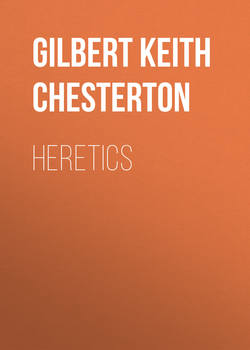Heretics

Реклама. ООО «ЛитРес», ИНН: 7719571260.
Оглавление
Gilbert Keith Chesterton. Heretics
I. Introductory Remarks on the Importance of Orthodoxy
II. On the negative spirit
III. On Mr. Rudyard Kipling and Making the World Small
IV. Mr. Bernard Shaw
V. Mr. H. G. Wells and the Giants
VI. Christmas and the Aesthetes
VII. Omar and the Sacred Vine
VIII. The Mildness of the Yellow Press
IX. The Moods of Mr. George Moore
X. On Sandals and Simplicity
XI Science and the Savages
XII Paganism and Mr. Lowes Dickinson
XIII. Celts and Celtophiles
XIV On Certain Modern Writers and the Institution of the Family
XV On Smart Novelists and the Smart Set
XVI On Mr. McCabe and a Divine Frivolity
XVII On the Wit of Whistler
XVIII The Fallacy of the Young Nation
XIX Slum Novelists and the Slums
XX. Concluding Remarks on the Importance of Orthodoxy
Отрывок из книги
It is foolish, generally speaking, for a philosopher to set fire to another philosopher in Smithfield Market because they do not agree in their theory of the universe. That was done very frequently in the last decadence of the Middle Ages, and it failed altogether in its object. But there is one thing that is infinitely more absurd and unpractical than burning a man for his philosophy. This is the habit of saying that his philosophy does not matter, and this is done universally in the twentieth century, in the decadence of the great revolutionary period. General theories are everywhere contemned; the doctrine of the Rights of Man is dismissed with the doctrine of the Fall of Man. Atheism itself is too theological for us to-day. Revolution itself is too much of a system; liberty itself is too much of a restraint. We will have no generalizations. Mr. Bernard Shaw has put the view in a perfect epigram: "The golden rule is that there is no golden rule." We are more and more to discuss details in art, politics, literature. A man's opinion on tramcars matters; his opinion on Botticelli matters; his opinion on all things does not matter. He may turn over and explore a million objects, but he must not find that strange object, the universe; for if he does he will have a religion, and be lost. Everything matters – except everything.
Examples are scarcely needed of this total levity on the subject of cosmic philosophy. Examples are scarcely needed to show that, whatever else we think of as affecting practical affairs, we do not think it matters whether a man is a pessimist or an optimist, a Cartesian or a Hegelian, a materialist or a spiritualist. Let me, however, take a random instance. At any innocent tea-table we may easily hear a man say, "Life is not worth living." We regard it as we regard the statement that it is a fine day; nobody thinks that it can possibly have any serious effect on the man or on the world. And yet if that utterance were really believed, the world would stand on its head. Murderers would be given medals for saving men from life; firemen would be denounced for keeping men from death; poisons would be used as medicines; doctors would be called in when people were well; the Royal Humane Society would be rooted out like a horde of assassins. Yet we never speculate as to whether the conversational pessimist will strengthen or disorganize society; for we are convinced that theories do not matter.
.....
Neither in the world of politics nor that of literature, then, has the rejection of general theories proved a success. It may be that there have been many moonstruck and misleading ideals that have from time to time perplexed mankind. But assuredly there has been no ideal in practice so moonstruck and misleading as the ideal of practicality. Nothing has lost so many opportunities as the opportunism of Lord Rosebery. He is, indeed, a standing symbol of this epoch – the man who is theoretically a practical man, and practically more unpractical than any theorist. Nothing in this universe is so unwise as that kind of worship of worldly wisdom. A man who is perpetually thinking of whether this race or that race is strong, of whether this cause or that cause is promising, is the man who will never believe in anything long enough to make it succeed. The opportunist politician is like a man who should abandon billiards because he was beaten at billiards, and abandon golf because he was beaten at golf. There is nothing which is so weak for working purposes as this enormous importance attached to immediate victory. There is nothing that fails like success.
And having discovered that opportunism does fail, I have been induced to look at it more largely, and in consequence to see that it must fail. I perceive that it is far more practical to begin at the beginning and discuss theories. I see that the men who killed each other about the orthodoxy of the Homoousion were far more sensible than the people who are quarrelling about the Education Act. For the Christian dogmatists were trying to establish a reign of holiness, and trying to get defined, first of all, what was really holy. But our modern educationists are trying to bring about a religious liberty without attempting to settle what is religion or what is liberty. If the old priests forced a statement on mankind, at least they previously took some trouble to make it lucid. It has been left for the modern mobs of Anglicans and Nonconformists to persecute for a doctrine without even stating it.
.....